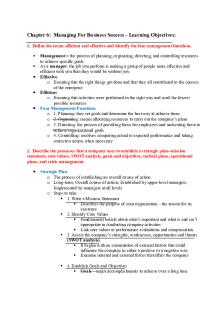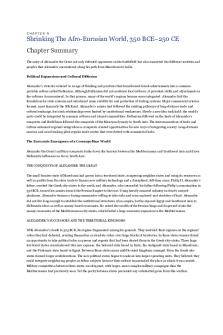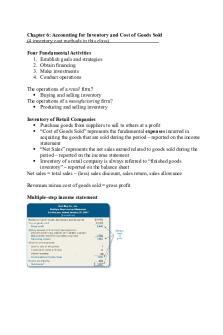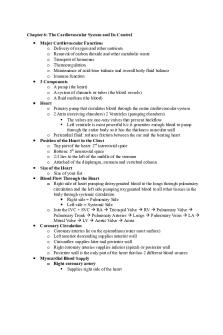Chapter 6-extension - Lecture notes 6 PDF

| Title | Chapter 6-extension - Lecture notes 6 |
|---|---|
| Course | Math 1 |
| Institution | British Columbia Institute of Technology |
| Pages | 45 |
| File Size | 305 KB |
| File Type | |
| Total Downloads | 5 |
| Total Views | 169 |
Summary
Lecture Notes-MATH 1-Judy Li(2020)...
Description
Legal Fundamentals for Canadian Business, 4e (Yates) Chapter 6 Agency and Employment 1) Which of the following is an example of an agent as opposed to an employee? A) Joe worked as a delivery driver for Smith Textiles Ltd. B) Joe worked as the purchasing agent for Smith Textiles Ltd. C) Joe worked in the mailroom of Smith Textiles Ltd., sorting mail. D) Joe worked as a janitor for Smith Textiles Ltd. E) Joe worked as a mechanic for Smith Used Cars Ltd. Answer: B Diff: 2 Type: MC Page Ref: 162 Skill: Applied 2) Miss Kachur is a training consultant who owns her own business and offers services to public and private organizations. Fortunately, as a result of her effective work, Sigma Corporation contracted with her to develop and provide training at its facilities throughout Canada. What began as a short-term consulting contract was extended for a period of years. Which of the following statements is true? A) Due to her ongoing relationship with Sigma Corporation, Miss Kachur would likely be considered an employee of the corporation. B) Because Miss Kachur operates her own business, she is likely an independent contractor in relation to Sigma Corporation. C) Miss Kachur would be considered an agent of Sigma Corporation. D) Although Miss Kachur operates her own business, she is likely a dependent contractor in relation to Sigma Corporation. E) If Sigma Corporation decided to terminate the contract with Miss Kachur, she would be entitled to employment insurance benefits. Answer: D Diff: 3 Type: MC Page Ref: 162 Skill: Applied 3) A principal is bound in contract with the third party with whom the agent dealt if the agent is: A) within his or her implied authority. B) within his or her express authority. C) within his or her apparent authority.
D) outside his or her authority but the principal ratified it. E) all of the above Answer: E Diff: 2 Type: MC Page Ref: 163, 164 Skill: Recall
4) An agency relationship can be created by: A) apparent authority. B) estoppel. C) ratification. D) actual authority. E) all of the above. Answer: E
Diff: 1 Type: MC Skill: Recall
Page Ref: 163, 164
5) In the process of assembling land for Ace Construction Ltd. to build a supermarket, Joe entered into a contract with the seller Sam. In which of the following situations would Sam be able to sue the principal, Ace? A) Sam would be able to sue Ace where Joe exceeded his apparent and actual authority. B) Sam would be able to sue Ace where Joe revealed that he was acting as an agent, but did not disclose that he was acting for Ace in particular, and exceeded both his apparent and actual authority. Ace did not ratify the contract. C) Sam would be able to sue Ace where Joe was acting outside his authority and did not disclose that he was acting for Ace. Sam was aware of Joe acting independently at the time he entered into the contract. D) Sam would be able to sue Ace where Joe exceeded his actual authority but where Ace had led Sam to believe that Joe had the authority. E) Sam would be able to sue Ace where Joe disclosed that he was acting for Ace but made the contract "subject to ratification." Answer: D Diff: 2 Type: MC Page Ref: 165, 166 Skill: Applied
6) Grant got a job with Ace Computers Co. (Ace) as a salesman. He was given a course in sales by Ace, business cards, and several of the company's order forms and brochures, and he was assigned an area in which he would sell computers door to door on behalf of Ace. Grant would be paid on a commission basis. At his first house, he was so excited by the interest shown that he forgot the explicit instructions he had received-only cash sales permitted. As an agent for Ace, he sold a computer on time to a 70-year-old woman. She was to pay $25 per month for eight years because that was all she could afford. When Brown, Ace's sales manager, heard of the deal, he fired Grant and said Ace would not go through with the contract. However, the old woman liked the computer very much and insisted that Ace provide her with one within the week as required by the contract. Which of the following accurately describes the legal position of the parties?
A) Ace would not be bound because Grant failed to follow the exact instructions he had received. B) Ace is not bound by the contract because no representations of authority were made by it to the old woman. C) Ace would be bound because Grant acted within his apparent authority. D) Brown is personally liable to the old woman because he is the employee of the company who decided not to honour the contract. E) Grant had implied authority to sell computers on time; selling computers necessitates selling on time, despite the prohibition. Answer: C Diff: 2 Type: MC Page Ref: 163 Skill: Applied 7) With respect to duties owed by an agent to his or her principal, which of the following statements is false with regard to agency law? A) Failure of an agent to obey his or her principal and to act within the authority given him allows the principal to sue the agent for breach of contract. B) When an agent enters a contract on behalf of his principal but does so in breach of his or her duties to the principal, the contract is void and cannot bind the principal. C) An agent must use reasonable care, skill, and diligence in the performance of his or her duties as agent. D) Generally, an agent may not delegate his or her authority without the authorization of his or her principal. E) Failure of an agent to perform his or her duties personally may allow his or her principal to sue the agent for breach of contract. Answer: B Diff: 2 Type: MC Page Ref: 163 Skill: Recall
8) Sam hires Joe to negotiate and sign a contract with Ken on Sam's behalf. Which of the following is true? A) If Joe acts outside express, implied, and apparent authority, Sam is not bound by the contract, even if he ratifies the contract. B) If Joe acts within his apparent authority, but outside his express or implied authority, Sam will be bound by the contract. C) If Joe acts outside his express authority and negotiates and signs the contract with Ken, Sam may not be a party to that contract. D) If Joe acts outside his express, implied, and apparent authority, he could be sued by Sam, but not by Ken, because he has no contractual relationship with Ken. E) If Joe acts outside his implied and express authority, Sam will owe him for his services. Answer: B Diff: 2 Type: MC Page Ref: 163 Skill: Applied 9) In certain cases, a third party can hold a principal to a contract even though the agent acted outside the authorization given him by his or her principal and even though his or her principal elected not to ratify the contract made by the agent. The third party can enforce the contract because of: A) the reasonable agent theory. B) the agent's apparent authority. C) agency by express agreement. D) fiduciary duty.
E) the failure of the principal to register the agency agreement. Answer: B Diff: 2 Type: MC Page Ref: 163 Skill: Recall 10) The president of Acme Co. introduces Bob to a third party as his vice-president of marketing and sales. In reality, however, Acme Co.'s president makes it clear to Bob that he is only the vice-president of marketing and has no authority to make sales. If Bob now enters into a contract for the sale of Acme Co.'s goods to the third party, as between Acme Co. and the third party: A) there is no contract because Bob does not have express authority over sales. B) there is no contract because Bob can only deal with matters of marketing. C) there is a contract because Bob had apparent authority to enter into it.
D) there is no contract because it was not ratified by Acme Co. E) there is a contract because Bob has express authority. Answer: C Diff: 2 Type: MC Page Ref: 163 Skill: Applied
11) With respect to the formation of agency by estoppel, which of the following statements is true? A) If the principal tells an agent specifically not to sell something and the agent, in disobedience of those instructions, sells it anyway, the principal may be bound by the contract because of estoppel. B) The issue of apparent authority arises only if a person acts as an agent when he or she has express or implied authority. C) When a party terminates an express agency agreement with an agent and notifies third parties with whom that agent normally dealt, that party will be liable on a contract made for it by that "fired" agent. D) When a third party suspects that the agent it deals with has no authority, there is no obligation on it to question the agent's alleged authority. E) When a party represents, by words or conduct, that someone is its agent, that party can later deny liability on a contract made for it by that agent on the basis that no express agency agreement existed. Answer: A Diff: 2 Type: MC Page Ref: 163 Skill: Recall 12) Although Jason had participated in the flower auction for the last nine years as an agent for Thos. Holt's Ltd. (Holt), with the authority to buy whatever he felt the store needed, on this day he was given express instructions to buy only cut flowers. When flats of young camellia bushes with a rare gold flower were being sold, Jason bought them on behalf of the company. Which of the following is true? A) Holt is not bound by the contract, because Jason's authority was expressly restricted. B) Holt is estopped from denying Jason's authority. C) The key to determining whether or not Holt is bound by the contract is this: in the circumstances, should the auctioneer have confirmed with Holt the extent of Jason's authority? D) Holt is not bound by the contract, because Jason is in breach of his agency agreement.
E) Holt is not bound since Holt didn't ratify the contract. Answer: B Diff: 2 Type: MC Page Ref: 163 Skill: Applied 13) If a third party relies on the principal's representation that the agent has the authority to act, which of the following is true? A) The principal can claim the agent had no authority. B) The principal cannot claim the agent had no authority. C) The principal can claim estoppel. D) The agent is solely liable for the conduct if it results in injury to the third party. E) The agent can sue the principal for breach of contract. Answer: B Diff: 2 Type: MC Page Ref: 163, 164 Skill: Recall
14) Which of the following is true with respect to the agency relationship? A) An agent acting gratuitously can never bind the principal.
B) When a principal has specifically limited the authority of the agent, that agent can never bind the principal in a contract, even if the agent acts outside his or her authority. C) Actual authority is the authority the principal has implied in conversations with a third party. D) An agent's authority is limited to whatever authority the principal specifically gives the agent. E) An agent's apparent authority may be implied from the position that the agent holds in the employer's organization. Answer: E Diff: 2 Type: MC Page Ref: 163, 164 Skill: Recall 15) A principal is not bound in contract with the third party with whom the agent dealt if the agent is: A) outside his or her authority but the principal ratified it. B) within his or her express authority. C) outside his or her actual and apparent authority. D) within his or her implied authority. E) within his or her apparent authority. Answer: C Diff: 1 Type: MC Page Ref: 164 Skill: Recall 16) Which of the following statements is false with regard to ratification in agency law? A) A principal cannot ratify a contract if he did not have the capacity to contract at the time the contract was made. B) A principal can ratify a contract inadvertently. C) If an agent exceeds her express authority, ratification is the only means by which the principal would be bound to honour the unauthorized contract. D) Ratification gives the agent authority retroactive to the time of contract. E) A principal cannot ratify a contract if at the time of the ratification he could not have entered into the contract. Answer: C Diff: 2 Type: MC Page Ref: 164, 165 Skill: Recall
17) Which of the following is correct with respect to the ratification of an agent's contracts? A) A principal can ratify a contract where the agent has gone beyond both his or her actual and apparent authority. B) A contract can only be ratified if the principal was not able to enter into the contract himself at the time of ratification. C) Ratification is always an intentional act and must be performed by the principal. D) When a contract entered into by an agent is ratified by a principal, it commences at the time the principal ratifies the contract. E) A principal can only ratify an agreement entered into by an agent if his or her name has not been used. Answer: A Diff: 2 Type: MC Page Ref: 164 Skill: Recall 18) Jonathan was a used-car enthusiast. He entered into an agency agreement with Andrea. She owned a used car lot. The agency agreement limited Jonathan's authority to purchase used vehicles for less than $25 000 and to ship them by flatbed to Andrea's lot. When passing through Toronto one Saturday morning, Jonathan stopped at an auto auction and saw a 1985 Jaguar that he wanted to bid on for Andrea. He was successful and purchased the vehicle for $24 000. However, he had no flatbed trailer and as such decided to drive the vehicle to Andrea's lot in London. He immediately arranged for automobile insurance on her behalf but without her authority. Near Kitchener he was involved in an automobile accident which resulted in the Jaguar being a total write-off. No one was injured. He contacted Andrea and informed her of the situation. She immediately contacted the insurance company to ratify the insurance contract. In these circumstances: A) so long as the initial call made by the agent was prior to the accident, the insurance contract can be ratified. B) given that there was no personal injury, the insurance contract can be ratified. C) Andrea was unable to ratify the contract because at the time she attempted to do so, the accident had already occurred. D) because Jonathan had apparent authority to enter into the insurance contract, it is binding on Andrea. E) a principal can only ratify an agreement entered into by an agent if his or her name has not been used. Answer: C Diff: 2 Type: MC Page Ref: 164, 165 Skill: Applied
19) Why is the distinction between employment and an independent contract important? A) An employee can bind the employer in a contract he enters into on behalf of the employer.
B) An independent contractor cannot be sure that she will be paid. C) Employees can withdraw their services. D) An employer may be held responsible for torts committed by the employee. E) An employee has the right to wages. Answer: D Diff: 1 Type: MC Page Ref: 165, 166 Skill: Recall 20) In which of the following situations will Smith be responsible for the tortious conduct of
Jones? A) Jones is a salesperson at Watson's Warehouse visiting Smith's grocery store. B) Jones is a computer programmer working for Ace Computer Ltd. and installing new software for Smith's department store. C) Jones is a self-employed vacuum cleaner salesman and Smith manufactures one of the lines he carries. D) Jones is a secretary working in Smith's office. E) Jones is an independent contractor installing drywall for Smith's grocery store. Answer: D Diff: 2 Type: MC Page Ref: 165 Skill: Applied 21) Which of the following statements is correct with respect to the employer's liability for the conduct of the employee? A) The employer is always liable for the wrongful conduct of his or her employee. B) Any employee can bind an employer in contract. C) All employees are agents of the employer. D) An employer is only liable for the wrongful conduct of his or her employee that takes place during the course of the employment. E) If a person is injured by an employee acting in the course of the job, that person must sue the employer, not the employee. Answer: D Diff: 2 Type: MC Page Ref: 165 Skill: Applied 22) Mr. Snarey devised and conducted a fraudulent scheme while working as an agent of Mutual Life. What would the likely result be? A) Neither the agent nor the company could be liable, because Snarey was only an agent, and the company had no actual knowledge. B) Only the agent was liable, because the action taken was dishonest and therefore outside the scope of the agency relationship. C) Since Snarey was an agent with authority to enter into this general type of transaction, the company was vicariously liable for his conduct. D) The company could be liable only if it were shown Snarey was an employee acting under the direction of a superior. E) The doctrine of caveat emptor was applied. Answer: C Diff: 3 Type: MC Page Ref: 165 Skill: Applied
23) Stu hires Jan to negotiate and sign a contract with Ken on Stu's behalf. Which of the following is false? A) If Jan acts outside express, implied, and apparent authority, Stu could still approve the contract and be bound by it. B) If Jan acts within her apparent authority, but outside her express or implied authority, Stu will be bound by the contract but may sue Jan for breach of her agency contract. C) If Jan acts within her implied authority, Stu will owe her for her services. D) If Jan contracts with Ken on behalf of Stu but acts outside her express, implied, and apparent authority, Ken could not sue her for breach of contract because Ken has no contract with her. E) If Jan acts within her express authority and negotiates and signs the contract with Ken, Jan is not a party to that contract. Answer: D Diff: 2 Type: MC Page Ref: 166 Skill: Recall 24) An agent with no express, implied, or apparent authority to do so identified himself as an agent for his principal, and on behalf of his principal bought a computer. The principal refused to ratify the contract. On these facts, which of the following is true? A) The seller could sue the principal for breach of warranty of authority. B) The principal would have to pay for the computer because the agent was an agent for that principal. C) The agent could be sued by the seller of the computer for breach of his warranty of authority. D) The seller of the computer could sue the agent for breach of contract for saying he was an agent. E) A third party cannot sue an agent even under these circumstances. Answer: C Diff: 2 Type: MC Page Ref: 166 Skill: Recall 25) Which of the following statements is true with regard to an agent's duties? A) A real estate agent may buy property from a third party if it is at a good price and then sell the property to his or her principal at a higher price. B) An agent must always scrupulously account for money coming into his or her hands on behalf of his principal. C)An agent need not disclose all relevant information to the principal. D) An agent is not entitled to the agreed-upon commission and reasonable expenses undertaken on behalf of his or her principal in carrying out his or her duties. E) An agent cannot act for two principals even with the knowledge and consent of those principals. Answer: B Diff: 2 Type: MC Page Ref: 167, 168 Skill: Recall
26) Identify the true statement concerning the law of principal and agent. A) An agent with no express authority can never bind his or her principal into a contract with a third party. B) An agent who puts himself in a position where the agent's interests conflict with those of the principal is in breach of his or her duties even though no actual harm comes to the principal.
C)Agency is only created by way of a contract. D) The principal and his or her agent owe each other the same duties. E) An agent can never be liable to the third party himself or herself while the principal will bear no such liability. Answer: B Diff: 2 Type: MC Page Ref: 167, 168 Skill: Recall 27) If Matt is an agent for Art, which of the following is false? A) Matt cannot act as an agent for Art and for the person Art is dealing with at the same time without the permission of both. B) Matt owes a fiduciary duty to Art. C) Matt could act as an agent for Art even if he were not paid to do so. D) Even when Matt is acting as an agent, he need not put the interest of Art above his own. E) Matt must use reasonable care, skill, and diligence in ...
Similar Free PDFs

Chapter 6 - Lecture notes 6
- 5 Pages

Chapter 6 - Lecture notes 6
- 6 Pages

Chapter 6 - Lecture notes 6
- 9 Pages

Chapter 6 - Lecture notes 6
- 11 Pages

Chapter 6 - Lecture notes 6
- 4 Pages

Chapter 6 - Lecture notes 6
- 3 Pages

Chapter 6 - Lecture notes 6
- 24 Pages

Chapter 6 lecture notes
- 1 Pages

Chapter 6 - Lecture Notes
- 16 Pages

Chapter 6 - Lecture notes 5
- 3 Pages

Quiz Chapter 6 - Lecture notes
- 7 Pages

Chapter 14 - Lecture notes 6
- 6 Pages

Chapter 9 - Lecture notes 6
- 5 Pages

Chapter 6 - Lecture notes 5
- 8 Pages
Popular Institutions
- Tinajero National High School - Annex
- Politeknik Caltex Riau
- Yokohama City University
- SGT University
- University of Al-Qadisiyah
- Divine Word College of Vigan
- Techniek College Rotterdam
- Universidade de Santiago
- Universiti Teknologi MARA Cawangan Johor Kampus Pasir Gudang
- Poltekkes Kemenkes Yogyakarta
- Baguio City National High School
- Colegio san marcos
- preparatoria uno
- Centro de Bachillerato Tecnológico Industrial y de Servicios No. 107
- Dalian Maritime University
- Quang Trung Secondary School
- Colegio Tecnológico en Informática
- Corporación Regional de Educación Superior
- Grupo CEDVA
- Dar Al Uloom University
- Centro de Estudios Preuniversitarios de la Universidad Nacional de Ingeniería
- 上智大学
- Aakash International School, Nuna Majara
- San Felipe Neri Catholic School
- Kang Chiao International School - New Taipei City
- Misamis Occidental National High School
- Institución Educativa Escuela Normal Juan Ladrilleros
- Kolehiyo ng Pantukan
- Batanes State College
- Instituto Continental
- Sekolah Menengah Kejuruan Kesehatan Kaltara (Tarakan)
- Colegio de La Inmaculada Concepcion - Cebu

